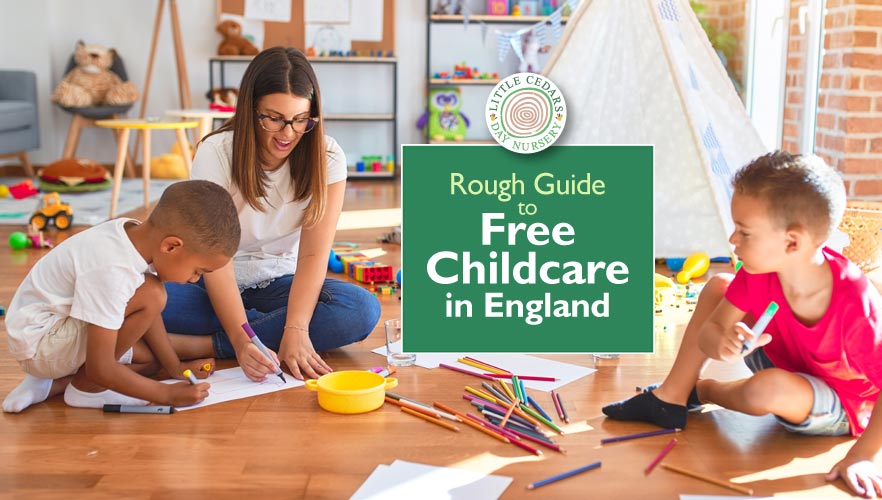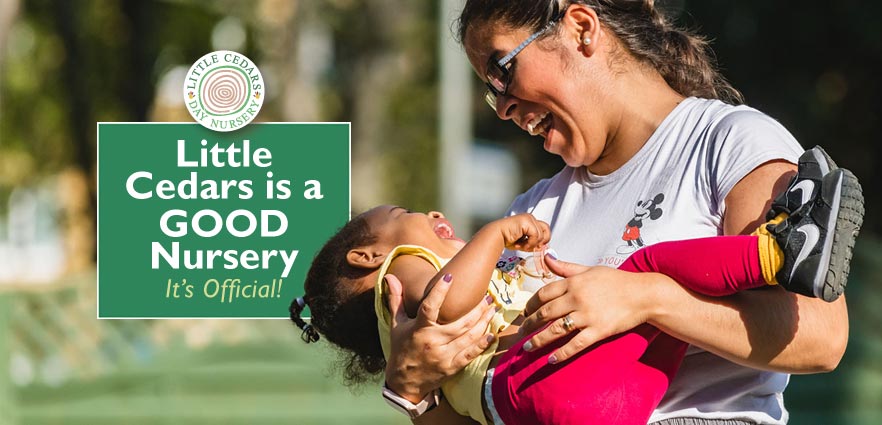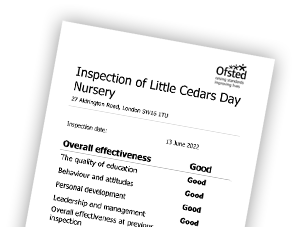
Today we provide a rough guide to free childcare schemes available in England. There are many different ways eligible families can obtain at the very least some free childcare, so today we look at the various Government schemes and options available. The good news is that there is even one that’s available to pretty much everyone — and it’s quite generous. We’ll take a look at that childcare funding scheme first.
‘Universal’ Free Childcare Hours for 3- & 4-Year-Olds
(The “15 Hours” Scheme)
Up to 570 Free Childcare Hours Available
 With Universal Free Childcare, children aged 3 or 4 can receive up to 570 hours of free childcare over the course of the year.
With Universal Free Childcare, children aged 3 or 4 can receive up to 570 hours of free childcare over the course of the year.- Also known as their Free entitlement, it typically equates to 15 hours of free childcare per week over the course of 38 weeks of the year.
- Some childcare providers may be able to stretch the hours out in a different pattern if it better suits families.
- The childcare would be available through a nursery, preschool or childminder that’s properly registered to offer free childcare places, plus some other types of provider.
Eligibility
Universal free childcare is not means tested and all children aged 3 and 4 living in England are eligible to receive the free hours. 3- and 4-year-olds moving to England from abroad are also entitled, even without British citizenship. Eligible children can start their free childcare in the term following their 3rd birthday.
How to Apply
Families should apply through their local childcare provider. If you live/work in Streatham and are interested in your child getting their free entitlement at Little Cedars Nursery, please apply here or get in touch to discuss a nursery place with us. You can also find out more about childcare funding via your local council (you can find yours here).
‘Extended’ Free Childcare Hours for 3- & 4-Year-Olds
(The “30 Hours” Scheme)
Free Childcare for Disadvantaged 2-Year-Olds
Tax-Free Childcare
Childcare Vouchers
(Closed to New Applicants)
Free Childcare Through Universal Credit
Free Childcare Through Tax Credits
(Closed to New Applicants)
Free Childcare for Children Aged from 9 Months
(Coming Soon)
Student Childcare Grants
Childcare Funding via the Care to Learn Scheme
Childcare Funding via the Learner Support Scheme
It’s worth noting that some of the schemes above can be used in tandem with one another, while others strictly cannot. Check the links for more information about each for more details.
Little Cedars Nursery, Streatham
High Quality Childcare Provision for Babies, Toddlers & Preschoolers in Streatham

 Little Cedars is officially a good nursery/pre-school and offers high quality childcare in Streatham, London SW16. Subject to eligibility and availability, we support Government childcare funding schemes for babies, toddlers, preschoolers and children under five at the setting.
Little Cedars is officially a good nursery/pre-school and offers high quality childcare in Streatham, London SW16. Subject to eligibility and availability, we support Government childcare funding schemes for babies, toddlers, preschoolers and children under five at the setting.
If you haven’t yet visited, why not bring your little one for a guided tour and you’ll soon see how well they fit in. We’re happy to answer any questions and would welcome your application for a childcare place. Please get started with your application or contact us using an option below and we’ll be delighted to help:
We are located in Streatham, close to Streatham Hill, Streatham Common, Streatham Park, Furzedown, Tooting, Balham, Norbury, Colliers Wood, West Norwood, Wandsworth, Clapham and Brixton.

 With Extended Free Childcare, eligible 3- and 4-year-olds can receive up to 1140 hours of free childcare per year instead of only 570.
With Extended Free Childcare, eligible 3- and 4-year-olds can receive up to 1140 hours of free childcare per year instead of only 570. Some disadvantaged children aged 2 can also receive up to 570 hours of free childcare over the course of the year.
Some disadvantaged children aged 2 can also receive up to 570 hours of free childcare over the course of the year. For those that are eligible, up to £2,000 in free childcare is available each year to children aged 11 or under* through the Tax-Free Childcare scheme.
For those that are eligible, up to £2,000 in free childcare is available each year to children aged 11 or under* through the Tax-Free Childcare scheme. You can sacrifice up to £55 per week of your earnings, which will be free of National Insurance and Income Tax, to fund Childcare Vouchers.
You can sacrifice up to £55 per week of your earnings, which will be free of National Insurance and Income Tax, to fund Childcare Vouchers. Following the Spring Budget 2023, childcare funding through Universal Credit is to be improved with nearly 50% more generous funding becoming available from July 2023.
Following the Spring Budget 2023, childcare funding through Universal Credit is to be improved with nearly 50% more generous funding becoming available from July 2023. Those already claiming for childcare costs via Working Tax Credits may be able to obtain up to £122.50 for one or £210.00 for more than one child each week.
Those already claiming for childcare costs via Working Tax Credits may be able to obtain up to £122.50 for one or £210.00 for more than one child each week. 2-year-olds may be eligible for the ’15 Hours’ scheme from April 2024.
2-year-olds may be eligible for the ’15 Hours’ scheme from April 2024. Up to 85% of childcare costs incurred by students may be claimed, up to a maximum of £188.90 per week for 1 child or £323.85 for 2 or more (correct for academic year 2023-2024).
Up to 85% of childcare costs incurred by students may be claimed, up to a maximum of £188.90 per week for 1 child or £323.85 for 2 or more (correct for academic year 2023-2024). Up to £160 per child is available each week for those living outside London.
Up to £160 per child is available each week for those living outside London. While it’s not designed to fund childcare, it can be used to do so in some circumstances.
While it’s not designed to fund childcare, it can be used to do so in some circumstances.
 Here’s how Ofsted rate Little Cedars Nursery:
Here’s how Ofsted rate Little Cedars Nursery: